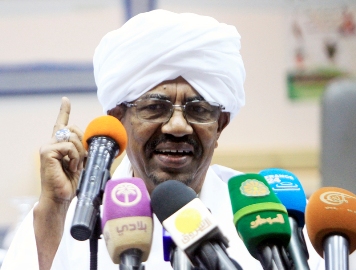Sudanese president says unrestricted freedoms lead to chaos
January 21, 2015 (KHARTOUM) – The Sudanese president Omer Hassan al-Bashir has underscored the call for national dialogue doesn’t mean allowing absolute liberties pointing that unrestricted freedoms pave the way for chaos.

He stressed the national dialogue would continue despite the hurdles, emphasising elections will be held on time with the participation of considerable political forces including the Democratic Unionist Party (DUP) led by Mohamed Osman al-Merghani.
Bashir launched a national dialogue initiative last January and urged political opposition and rebel groups to join but his call faced major setback after the NUP withdrew following the one month detention of al-Mahdi in May.
Opposition forces refused to join the dialogue asking to create a political conducive environment, to release freedoms, to stop war and to allow humanitarian access for civilians in the conflict areas.
In a statement released on Tuesday, the Reform Now Movement (RNM) of Ghazi Salah Eddin al-Attabani and the Just Peace Forum (JPF) led al-Tayeb Mustafa decided to “suspend participation in the national dialogue until the requirements of a conducive environment (…) are met”.
The two opposition parties urged the implementation of confidence building measures agreed in the roadmap of the national dialogue and endorsed by the regional and international organisations supporting the process.
OVERCOMING ECONOMIC HARDSHIPS
Bashir said that Sudan managed to overcome significant obstacles which the opposition forces thought would lead to the collapse of the regime within a short period of time.
“We emerged [from these hurdles] to safety particularly in the economic sphere [where we applied] the emergency economic stabilization program which achieved significant positive results”, he added.
The Sudanese president pointed the decline in global oil prices helped his government not to resort to lifting subsidies on gas price, saying the $24 per barrel which Sudan receives in oil transit fees from South Sudan is currently equivalent to half of the market price of a barrel of oil.
In September 2013, protests erupted in Sudan’s major towns following an announcement by the government that it was reducing subsidies on fuel and other basic commodities, leading to calls for regime change. At least 200 protesters died, 15 of them children and more than 800 others have been detained.
Sudan lost 75% of its oil reserves after the southern part of the country became an independent nation in July 2011, denying the north billions of dollars in revenues. Oil revenue constituted more than half of Sudan’s revenue and 90% of its exports.
(ST)
